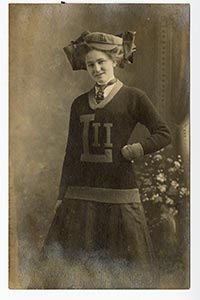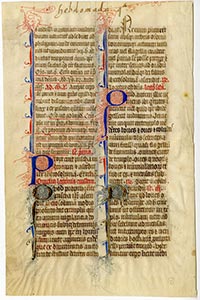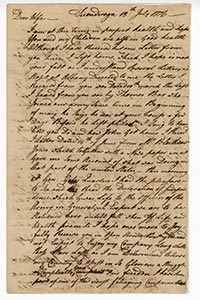 There is an air of mystery about being an archivist.
There is an air of mystery about being an archivist.
Old papers, books, photographs, video – archivists work with these items every day.
What exactly does an archivist do? Why does Louisiana Tech need an archive in the digital age?
“My mission as the archivist for Louisiana Tech and its unique collection is to ensure that all of these materials are available for you and your descendants far into the future,” said Nolan Eller, Louisiana Tech University Archivist. “Part of this mission includes growing our collections to ensure that they adequately reflect the histories of our wonderful University and alumni. We are always interested in acquiring new collections, which will further illuminate Louisiana Tech’s truly fascinating history.”
In order to understand what an archivist does, it’s important to understand the differences between an archive and the archives, as well as gain an understanding of the history of the profession.
An archive is a collection of materials that has been deemed historically significant. These various collections come in many shapes and sizes and can be composed of anything, including photographs, journals, scrapbooks, letters, and artifacts.
Archive collections can be large, such as those of corporations, universities, and nations, and collections are housed at organizations such as Walmart, our own archives at Louisiana Tech, and the Louisiana State Archives. Archive collections can also be small and personal, like those cherished collections held in our homes in boxes, scrapbooks, and photo albums.
 An archives is the physical location in which these different collections are housed, and the archivist is the custodian of these collections. It is the responsibility of the archivist to collect, organize, preserve, and make available the materials in these different collections. The concept dates back to early civilizations, like the Egyptians, Greeks, and Romans. Archives were associated with governments and legislative bodies and were not accessible to the general public.
An archives is the physical location in which these different collections are housed, and the archivist is the custodian of these collections. It is the responsibility of the archivist to collect, organize, preserve, and make available the materials in these different collections. The concept dates back to early civilizations, like the Egyptians, Greeks, and Romans. Archives were associated with governments and legislative bodies and were not accessible to the general public.
“Public accessibility to archives changed during the French Revolution, with the rise of the ideal of the freedom of information,” Eller said. “The French believed that it was the right of the public to have access to all records of the past and current regimes, so they established the Archives Nationales, and with it, they created archival concepts that we practice to this day.”
The establishment of archival institutions in the United States came later. The State of Alabama established the first state archives in 1901, and the United States National Archives was established in 1934.
Shortly thereafter, in 1945, came the establishment of Louisiana Tech’s own archives. Since then, archivists have been dedicated to ensuring that the histories of Louisiana Tech, Ruston, and Lincoln Parish are collected, preserved, and made accessible to the public.
“The University Archives and Special Collections at Louisiana Tech is a truly wonderful place, composed of many significant collections that correspond to the histories of Louisiana Tech University, Lincoln Parish, and the world as a whole,” Eller added.
These collections include the presidential papers of all past Louisiana Tech presidents dating back to George W. Bond (1928-36), as well as campus publications, University photographs, the congressional papers of Congressman Joe Waggonner, artwork from art professors Mary Moffett and Albino Hinojosa, and much more.
The University Archives are most known for the Camp Ruston collection, which is composed of both artifacts and records of the World War II-era prisoner-of-war camp located outside of Grambling.
 Another well-known collection is the Frellsen Fletcher Smith collection. This collection is composed of various signed documents from famous figures of British and American literature and history, including Charles Dickens, H.G. Wells, George Orwell, Henry David Thoreau, Ralph Waldo Emerson, President James Madison, and both Louis the XIV and Louis the XVI of France. University Archives also houses the Israel Shreve Revolutionary War letters, the Marshall Harvey Twitchell papers, and the E.M. Graham family papers, just to name a few.
Another well-known collection is the Frellsen Fletcher Smith collection. This collection is composed of various signed documents from famous figures of British and American literature and history, including Charles Dickens, H.G. Wells, George Orwell, Henry David Thoreau, Ralph Waldo Emerson, President James Madison, and both Louis the XIV and Louis the XVI of France. University Archives also houses the Israel Shreve Revolutionary War letters, the Marshall Harvey Twitchell papers, and the E.M. Graham family papers, just to name a few.
The Special Collections hold some of Louisiana Tech’s oldest materials and include artifacts from Louisiana’s indigenous peoples as well as medieval European illuminated manuscripts dating to the 14th Century.
“The University’s collections are vast with much to explore and many interesting things to learn, and all materials housed in our Archives are available for everyone to see, use, and enjoy,” Eller said. “As we celebrate the 125th anniversary of the founding of Louisiana Tech and ‘those old Tech days, those joyful days, so cherished in my memory,’ remember the Louisiana Tech Archives and Special Collections.
“We are here for you, to ensure that your cherished memories of ‘those old Tech days’ will last forever.”
